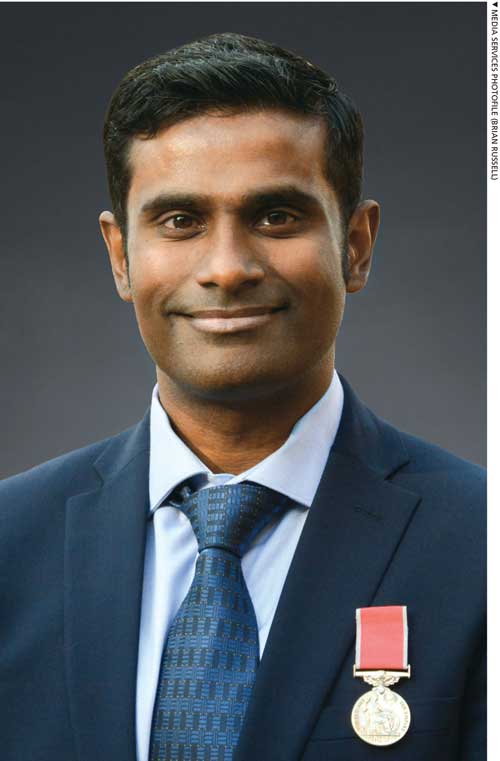Dr. Hareen De Silva
Why healthcare is a human right

Q: What inspired you to become involved in global health – and how has your perspective on healthcare evolved through your work in Greece, Iraq, Syria and Ukraine?
A: My family inspired me to pursue a career where I could help the most. While I was already a general practitioner in the UK, I felt I could have a bigger impact working in global health.
Helping people is ingrained in our culture. I saw my family help others around them even though they didn’t have the means at certain times in my childhood
Working in humanitarian aid, I see people in what’s potentially the worst time of their lives – and I could make a lasting impact on their lives. I’ve seen the worst and best of humanity working in conflict zones, and this has helped me learn that healthcare is a human right and should never be thought of as a luxury.
Q: As a faculty member of World Extreme Medicine, what unique challenges and opportunities do extreme environments present for healthcare professionals?
A: I love teaching! Moreover, I believe that it is my calling, and I enjoy teaching humanitarian medicine to professionals and healthcare students. I use stories and experiences from my career; it is beneficial as a teaching tool to cite real world examples of theory.
I’m also lucky to work on expeditions, which means I can take my office outdoors. I’ve been lucky to work on expeditions in Dominica, Costa Rica, Gough Island and Midway Atoll. It is great to free myself from the desk and support teams working in these places.
Most of the medicine is prevention – such as good hygiene, hydration, health and safety, and foot care. If these are tackled early and properly, you can enjoy the environment around you, and immerse yourself in new cultures, food and nature.

Q: What do you see as the most pressing global health challenges?
A: The biggest threat to global health is climate change. There are more climate-related disasters occurring worldwide, which are causing the displacement of populations.
In Sri Lanka, El Niño resulted in a delay in the southwestern monsoon, causing water scarcity, destroying 45,000 acres of paddy fields and limiting access to water for 140,000 people. There are many issues relating to drought such as an uptick in dengue cases last year compared to 2022.
Over time, we’ll see parts of the world that are inhabitable and people moving away from them, likely leading to conflict because of dwindling resources.
As healthcare professionals, we’re responsible for public health as well and being aware of our own carbon footprint is important. These changes can then be expanded into our clinical practice.
Sri Lanka will not be immune to climate change over the coming years.
Q: In what ways have you seen technology and innovation impact healthcare delivery?
A: Since the COVID-19 pandemic, general practice has embraced remote consultations. This could be in the form of video calls, email consultations or simple voice calls, giving patients more choice as to how they want to be seen.
There has also been a move to use more electronic prescribing to enable medication to be sent where patients want and avoid printing prescriptions, thereby reducing paper waste and carbon footprints.
In humanitarian aid, there’s always been great use of technology in areas such as surveillance of communicable diseases with data collection kits using tablets, and mobile phones and servers, to collect and disseminate information.
The organisation I work for (CADUS) produces equipment and vehicles to be used in our humanitarian responses – such as the vehicles we have used in Ukraine for medical evacuations.
Q: Are there specific health issues in Sri Lanka that you find particularly compelling?
A: My main concern for Sri Lanka is food insecurity. There’s been economic stabilisation but families continue to face nutritional challenges due to food insecurity. Many people have lost their livelihoods and cannot afford to feed themselves.
As a Sri Lankan, this is heartbreaking– especially after reading the World Food Programme (WFP) report from May 2023 about the country’s food situation.
Over 2.9 million Sri Lankan children needed humanitarian assistance to access lifesaving nutrition, healthcare, education, water and sanitation, and social protection services. At that time, 3.9 million people in Sri Lanka were moderately food insecure.
FACT FILE
FAMILY
Father – Bandula De Silva (musician)
Mother – Anuja De Silva (Office Manager for the Secretary-General of the Commonwealth Secretariat)
SCHOOLING
Bexley Grammar School
HIGHER EDUCATION
BSc in sports and exercise medicine (Queen Mary University of London)
MBBS (Barts and the London School of Medicine and Dentistry)
Master’s in public health (University of Sheffield)
Fellow of the Royal College of General Practitioners
PRESENT OCCUPATION
General practitioner
COUNTRY OF RESIDENCE
UK
CITY OF RESIDENCE
London
CV IN A NUTSHELL
Dr. Hareen De Silva is a Fellow of the Royal College of General Practitioners (RCGP). Having served as the UK national wellbeing lead for early career GPs, he went on to become the youngest faculty chair in the history of the RCGP.
De Silva’s career spans general practice, expeditions, and humanitarian aid and medical education.
He also has an interest in health inequalities, is a trustee of the UK education charity Fairhealth and received a British Empire Medal in 2020 for his GP work.
